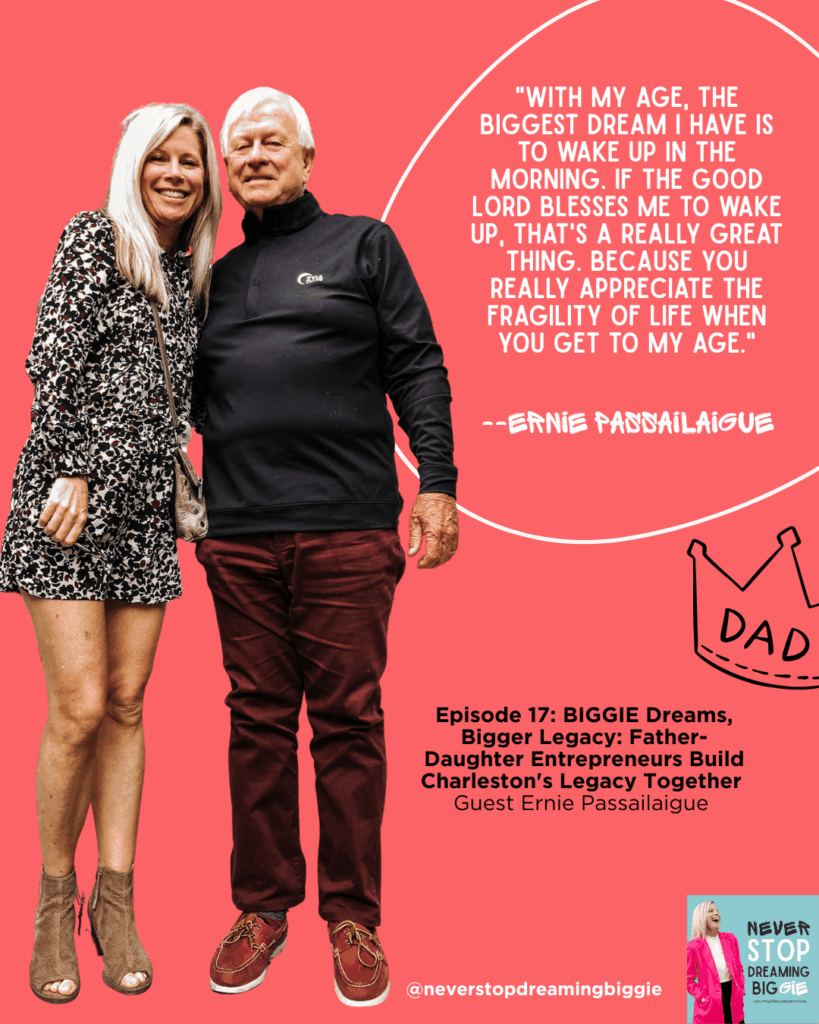Why you should go for the big dream!
Dreaming Big
build accountability systems that celebrate progress
Dreaming Big
3 questions that transform your endless to-do list
organization
Manifesting Your Dreams
dreaming big
Browse around
topics
Hey!
founder + CEO
I'm Angel
Throughout my life, I've embarked on an extraordinary adventure filled with remarkable stories. God has bestowed upon me countless blessings, and now, I am driven to share these blessings with others. Delve into my story to discover more. Read my story
How to Better Organize Canva for your Social Media
social media
How to Use Power Hours to Get Work Done
organization
90-Minute Reset for ambitious women
organization
Manifesting Your Dreams
dreaming big
Dream Bigger
Hi, I’m Angel Holmes—founder of The Brighter Side Society, where ambitious women find accountability, community, and systems that make success simple.
✨Stop doing business alone.
BIGGIE Dreams, Bigger Legacy: How Father-Daughter Entrepreneurs Built Charleston’s Future Together

Posted In
September 9, 2025
Posted On
Episode 17 of Never Stop Dreaming BIGGIE features Ernest Leroy Passailaigue Jr., former South Carolina State Senator and founder of the SC Education Lottery
The Man Behind Charleston’s Transformation
When Angel Holmes mentions her father’s name to people in Charleston, she’s often met with blank stares. This breaks her heart because Ernest “Ernie” Passailaigue Jr. is one of the key figures who transformed Charleston from a struggling Southern city into the thriving destination we know today.
In Episode 17 of Never Stop Dreaming BIGGIE, this father-daughter entrepreneur duo shares the untold stories behind Charleston’s biggest developments and reveals what it truly takes to build a legacy that spans generations.
From CPA to Charleston Legend: Ernie Passailaigue’s Journey
Early Career and Education
Born November 9, 1947, Ernest Leroy Passailaigue Jr. built his foundation through education and service:
- Graduated from Porter Gaud School (formerly Porter Military Academy) in 1965
- Earned his degree from University of South Carolina (1969)
- Received MBA from The Citadel as part of their first graduating MBA class (1974)
- Served in South Carolina Air National Guard (1969-1975)
- Became a Certified Public Accountant, passing on his first attempt
The Baseball Years: Creating Community Through Sports
Before entering politics, Ernie co-owned Charleston’s minor league baseball team from 1981-1987. The team, originally affiliated with the Kansas City Royals, became known as the Charleston Rainbows after Rainbow Row when they switched to the San Diego Padres affiliation in 1984.
Angel fondly remembers working in the “Porta Gaud Lounge” at College Park, where the team played before moving to their current downtown location. The father-daughter team created innovative promotions including quarter beer nights and bikini contests that made baseball games must-attend community events.
Political Leadership: Representing Everyone
South Carolina State Senate (1988-2001)
Ernie served in the South Carolina Senate representing the 43rd District for 13 years. His approach to public service was revolutionary for its time – focusing on community needs rather than partisan politics.
As Ernie explains in the episode: “Once you get elected, you represent everybody. You don’t represent just Republicans, and you don’t represent just Democrats. You represent everyone.”
Major Accomplishments in Office
Infrastructure Development
- Instrumental in securing funding for the Cooper River Bridge replacement (now the Arthur Ravenel Jr. Bridge)
- Advocated for fair resource allocation across South Carolina regions
Charleston’s Fair Share Ernie fought tirelessly to ensure Charleston received equitable state funding. His formula was simple but effective: divide discretionary state spending into thirds – one-third for Greenville/Spartanburg, one-third for the Midlands including Columbia, and one-third for the Lowcountry.
The Hunley Project Participated in raising the Civil War submarine H.L. Hunley, bringing this piece of Charleston history back to the surface for research and preservation.
1990 Gubernatorial Campaign
In 1990, Ernie ran for Governor of South Carolina, launching his campaign in Greenville at Brandon Mill where baseball legend Shoeless Joe Jackson once played. Though he didn’t win the Democratic primary, the campaign opened doors and raised his profile statewide.
Building Something from Nothing: The South Carolina Education Lottery
Starting from Scratch
After leaving the Senate in 2001, Ernie was appointed as the first Executive Director of the newly approved South Carolina Education Lottery. His entrepreneurial challenge was immense:
“I was employee number one. I started August 7th of 2001 and we were selling lottery tickets January 2nd, 2002. When I started work, there was nobody but me. There was not a telephone, there was not a desk, there was not a fax machine, there was not a computer. It was just me.”
In less than five months, Ernie built an entire organization from the ground up that now generates millions for South Carolina education.
Legacy Building: Lessons for Modern Entrepreneurs
What Real Public Service Looks Like
The episode reveals crucial insights for entrepreneurs and leaders:
Listen to Your Community Ernie’s approach involved going door-to-door, literally listening to constituents’ needs and taking detailed notes. He would then work to address specific issues, from trash collection to infrastructure needs.
Build Coalitions Across Differences Working closely with both Democrats and Republicans, including Senator Glenn McConnell and Representative Jimmy Bailey, Ernie proved that shared community goals transcend party lines.
Fight Strategically for Resources Rather than accepting Charleston’s historic disadvantage in state funding, Ernie and his colleagues systematically changed how resources were allocated across South Carolina.
The Ultimate Measure of Success
When asked about his biggest dream come true, Ernie’s answer wasn’t about bridges, businesses, or political victories:
“I’d have to say my family. I don’t know how much of a bigger dream you can have than to have a beautiful family like I have.”
With seven children and 14 grandchildren, Ernie demonstrates that true entrepreneurial success includes building strong family relationships alongside professional achievements.
Modern Lessons from a Charleston Legend
For Family Business Owners
The Holmes-Passailaigue story demonstrates how values transfer across generations. Angel’s approach to community building through events like the Charleston Wine & Food Festival and her development of The Holmestead Bar & Retreat clearly reflects lessons learned from watching her father serve others.
For Women Entrepreneurs
Angel’s perspective as a female entrepreneur building on her father’s legacy offers unique insights into:
- Balancing family responsibilities with ambitious business goals
- Using inherited credibility to open doors while building your own reputation
- Creating businesses that serve community needs beyond profit
For Public Servants and Community Leaders
Ernie’s approach provides a blueprint for effective leadership:
- Represent all constituents, regardless of political affiliation
- Document your work so future generations understand the foundations they’re building on
- Measure success by community impact, not personal gain
The Fragility of Life and Daily Gratitude
At 77, Ernie’s perspective on life carries weight earned through experience:
“With my age, the biggest dream I have is to wake up in the morning. If the good Lord blesses me to wake up, that’s a really great thing. Because you really appreciate the fragility of life when you get to my age.”
This wisdom reminds entrepreneurs that while building businesses and legacies is important, appreciating each day’s opportunities for impact matters most.
Honoring Those Who Built What We Enjoy
Angel’s frustration when people don’t recognize her father’s contributions highlights a broader issue: as communities grow and change, we risk forgetting the people who built the foundations we’re standing on.
Charleston’s transformation from a struggling port city to a world-class destination didn’t happen by accident. It required visionary leaders like Ernie Passailaigue who were willing to fight for resources, build coalitions, and put community needs above personal political gain.
The Ernie Passailaigue Connector, which links downtown Charleston to the Ashley River Bridge, serves as a physical reminder of his contributions. But his true legacy lives in the institutions, infrastructure, and community spirit that continue to make Charleston special.
Key Takeaways for Entrepreneurs
- Start with service, not self-interest – Build businesses and careers that genuinely serve community needs
- Document your journey – Future generations need to understand how foundations were built
- Build relationships across differences – Success requires coalition-building beyond your immediate circle
- Family is the ultimate legacy – Professional achievements mean little without strong personal relationships
- Fight strategically for fair treatment – Persistence and patience can overcome systemic disadvantages
- Create memorable experiences – Whether it’s quarter beer night or community festivals, people remember how you made them feel
- Wake up grateful – Each day offers new opportunities to make meaningful impact
Conclusion: Building Legacies That Last
The father-daughter conversation in Episode 17 demonstrates that true entrepreneurial success isn’t measured by personal wealth or recognition. It’s measured by how many people you lift up, how much you improve your community, and what kind of foundation you build for future generations.
Ernie Passailaigue’s story proves that with vision, persistence, and genuine care for others, one person can transform an entire region. His daughter Angel is now building on that foundation, creating new businesses and communities that serve others while honoring the values he modeled.
For entrepreneurs wondering how to build something meaningful, the Passailaigue legacy offers a clear blueprint: dream big, serve others, document your journey, and never forget that family relationships are the ultimate measure of success.
As Charleston continues to grow and evolve, stories like Ernie’s remind us to honor those who built what we enjoy while working to build something even better for those who come after us.
Listen to the full episode of “BIGGIE Dreams, Bigger Legacy” wherever you get your podcasts. Learn more about Never Stop Dreaming BIGGIE at neverstopdreamingbiggie.com

Pin
Share
Previous Story
next Story
Never stop dreaming biggie podcast
the brighter side society
1:1 Business Coaching + Mentorship
Full of tips, trends, and other cool stuff that you don't want to miss.
Sign Up for Weekly Newsletter
© 2025 Sipindipity, LLC | Business Coaching for Women Entrepreneurs | The Brighter Side Society
Business coaching for women entrepreneurs
— structure, support, and sisterhood.